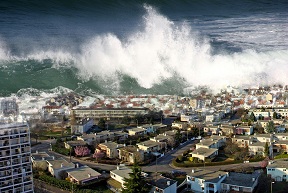Improved tsunami alert system through international partnerships

date: 21/10/2014
Project: Distant early warning System
acronym: DEWS
See also: CORDIS
Contact: Contact
Quick responses are therefore vital. “Tsunamis travel very quickly and occur relatively near the shore. It may be only a matter of 15-20 minutes after the earthquake that the wave hits the shore,” says José Fernando Esteban of Atos Origin Spain.
Early detection can greatly reduce loss of life. “Analysis must take no longer than 10 minutes in order to give the authorities enough time to react and take urgent measures…every minute is crucial,” he adds.
Esteban led an EU-funded international research project that developed the Distant Early Warning System (DEWS) which detects tsunamis as early as possible and allows emergency agencies to improve their responses.
DEWS has already been installed in Indonesia and other versions of the system have been developed for use in the Mediterranean region. The system positions sensors at sea and on the coast to pick up earthquakes and to determine the size of the tsunami waves that they are likely to produce and where they will strike on the coastline. DEWS processes this data and provides authorities with all the relevant information needed for making a decision on the type of public warning messages that are required.
Outside the European Union (EU), the project team’s partners were universities and governmental emergency agencies in New Zealand, Thailand, Indonesia and Sri Lanka, as well as a leading Japanese agency focusing on geo-science and disaster prevention.
The Badan Meteorologi Klimatologi dan Geofisika (BMKG), the meteorological, climatological and geophysical agency of Indonesia, for example, supported the project in the development of guidelines and protocols as well as in the evaluation of test beds. BMKG is in charge of the Indonesian Early Warning System and the Organisational Structure for Disaster Management Coordination, as well as the National Earthquake Information Centre in Jakarta.
With the support of local staff, DEWS was successfully installed at BMKG for evaluation and testing purposes in a closed and secure test environment.
